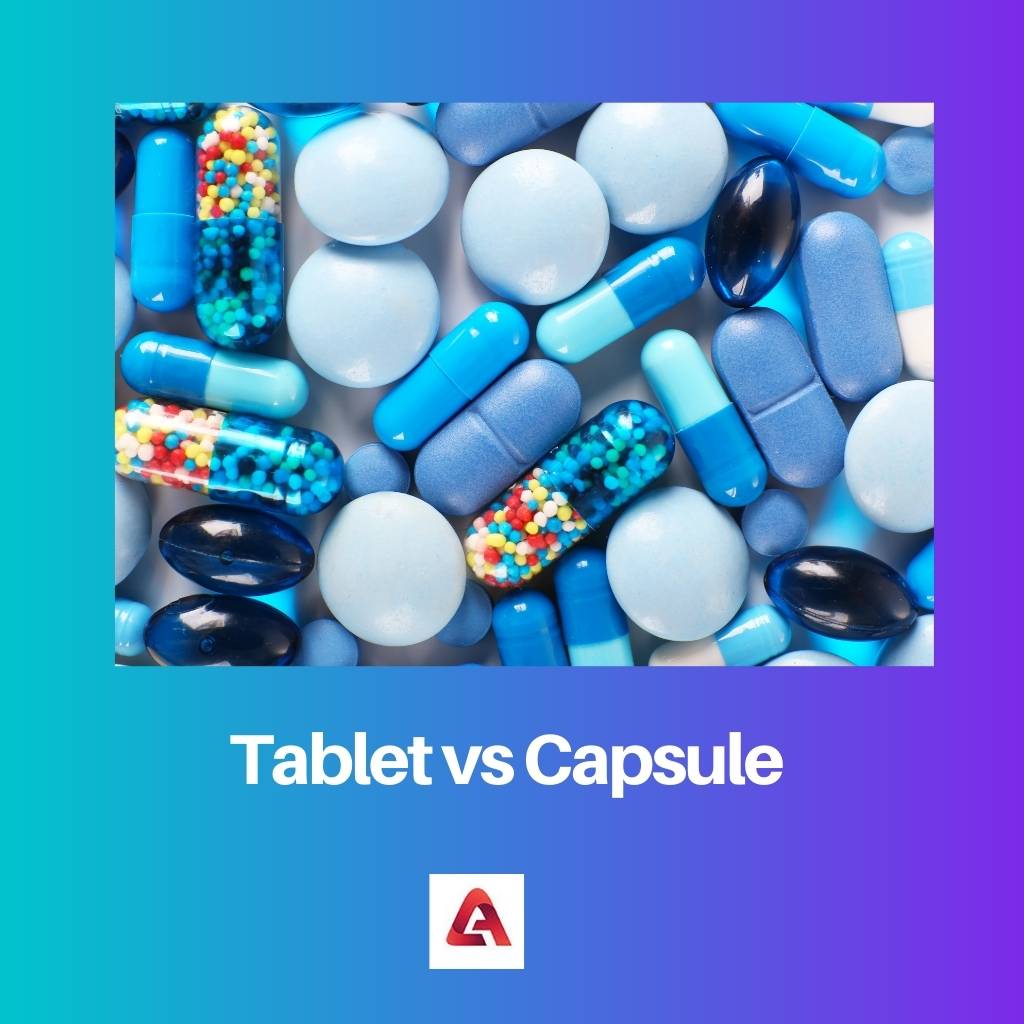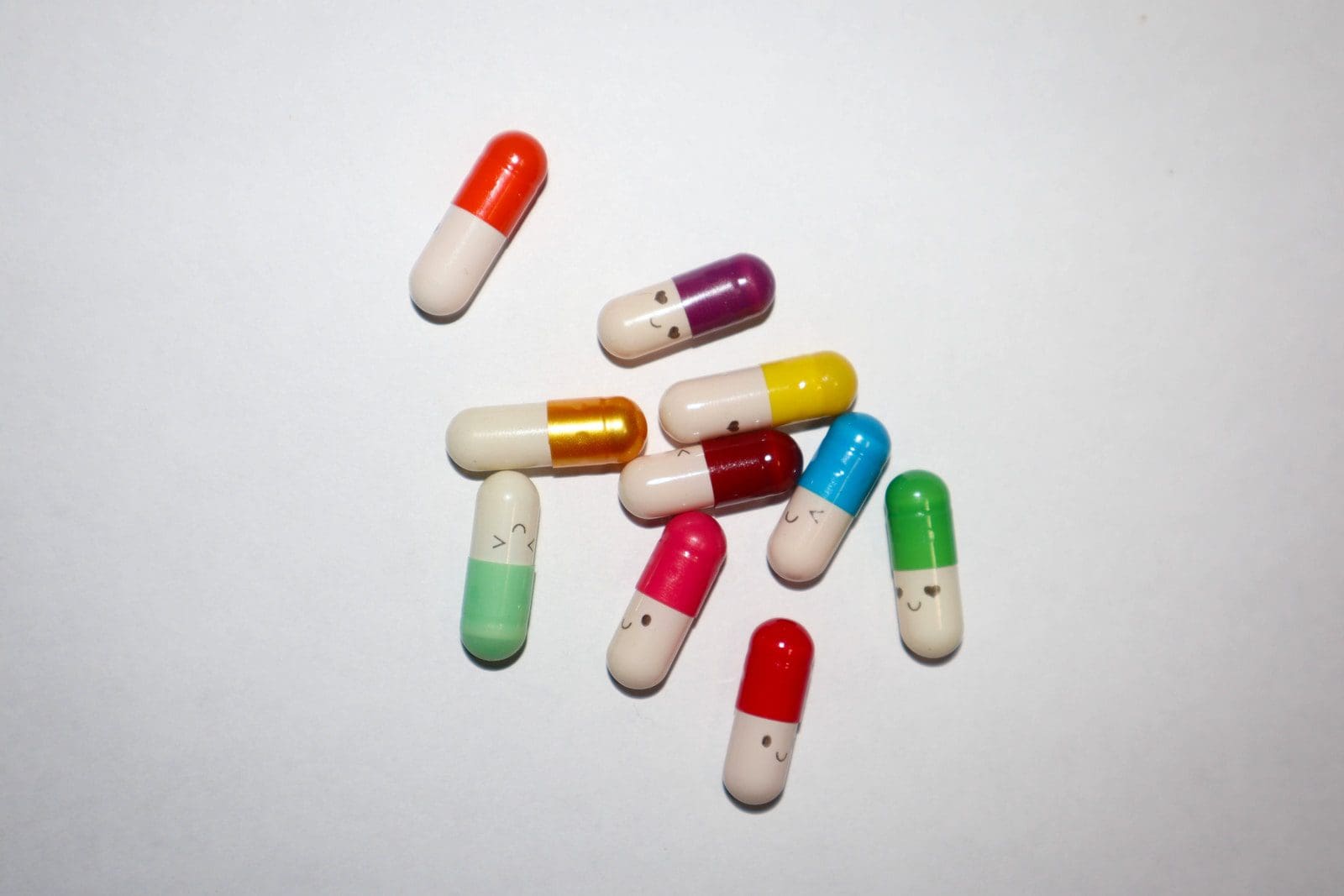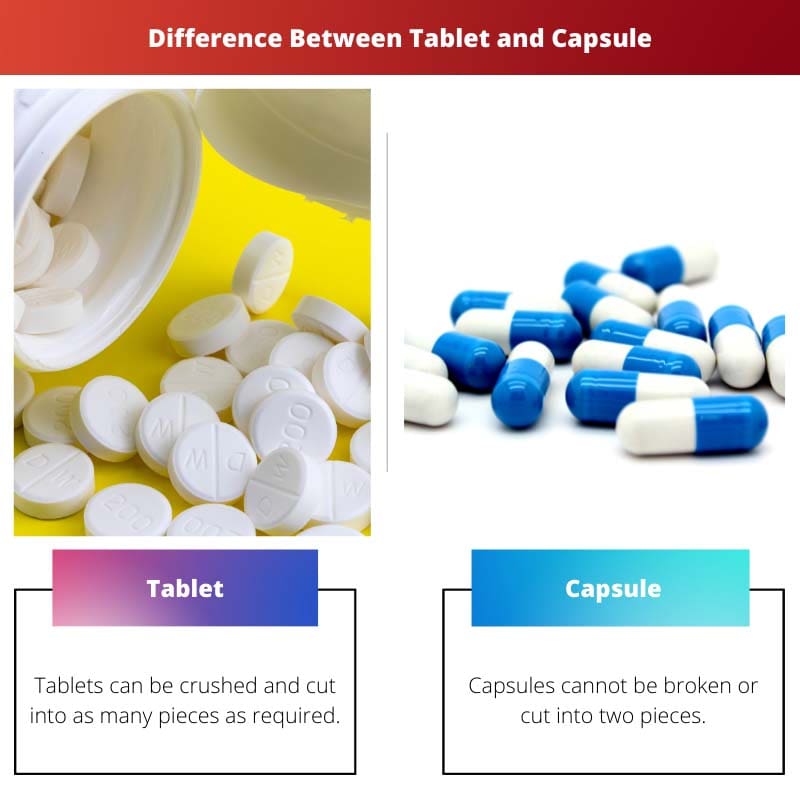Tablets and Capsules are both oral medications and are extremely popular in-demand oral pharmaceutical dosages. Doctors mainly prescribe medicine in the form of Tablets and Capsules.
Tablets and Capsules are both different forms of medication we take in case of any disease or sickness. Although both Tablets and Capsules are oral medications and almost work in a similar way, they differ from each other in many ways.
Key Takeaways
- Capsules and tablets are both pharmaceutical dosage forms.
- Tablets are hard and rigid, while capsules are small shells containing medicine.
- Tablets can be split in half to adjust the dosage, while capsules cannot be split.
Tablet vs Capsule
The difference between Tablet and Capsule is that Tablet is a type of oral dosage that can be cut or crushed. On the other hand, Capsule is a type of oral dosage that has to be swallowed because Capsules cannot be cut or crushed. Also, Tablets are cheap compared to Capsules, which are quite expensive.

Tablets are the most commonly used oral pharmaceutical dosage prescribed by doctors in the case of any illness or disease. They are cheaper, safe, and easy to use. Tablets are flat, disc-shaped, or round.
They can be cut or crushed, and they do not get absorbed immediately into the bloodstream when swallowed. Tablets take more time to show any response.
Capsules are oral pharmaceutical dosages prescribed by doctors in case of any illness. They are expensive compared to cheap tablets. Capsules are only cylindrical, and they cannot be cut or crushed.
Hence, capsules have to be swallowed. Capsules have a drug that is known to enter the bloodstream immediately when swallowed. Capsules show a faster response compared to Tablets.
Comparison Table
| Parameters of Comparison | Tablet | Capsule |
|---|---|---|
| Division | Tablets can be crushed and cut into as many pieces as required. | Capsules cannot be broken or cut into two pieces. They have to be swallowed. |
| Price | Tablets are cheap compared to Capsule. | Capsules are expensive. |
| Shape | Tablets are round, flat, or disc-shaped. | Capsules are cylindrical in shape. |
| Absorption | Tablets have sugar or a similar coating, and hence, the drug contained in it does not get immediately absorbed into the bloodstream when swallowed. | Capsules have a drug that is known to enter the bloodstream immediately after being swallowed. |
| Potential | Tablets can retain their potential for a long time. | Capsules have lesser potential compared to Tablets. |
| Response | Tablets take time to show any response. | Capsules show response faster than Tablets. |
| Form | Tablets are made by compressing one or more powdered ingredients in the form of a solid. | Capsules contain a jelly or powdery substance enclosed in a plastic container that can be dissolved. |
| Size | Tablets can be found in different shapes and sizes. | Capsules are found or are available only in one size. |
| Shelf- life | Tablets have a higher shelf life. | Capsules have a lesser shelf life compare to Tablets. |
What is Tablet?
Tablets are the most commonly used oral pharmaceutical dosage prescribed by doctors in the case of any illness or disease. Tablets are made by compressing one or more powdered ingredients in the form of a solid.
They can be found in different shapes and sizes and are round, flat, or disc-shaped.
Tablets have sugar or a similar coating, and hence, the drug contained in it does not get immediately absorbed into the bloodstream when swallowed.
Tablets have a high shelf life and can retain their potential for a long time. Tablets are cheaper compared to Capsules.
Tablets can be crushed or cut into as many pieces as required. Kids might find it difficult to Swallow Tablets. Tablets take time to show any response.

What is Capsule?
Capsules are oral pharmaceutical dosages prescribed by doctors in case of any illness. They are expensive compared to cheap tablets.
Capsules contain a jelly or powdery substance enclosed in a plastic container that can be dissolved. Capsules are found only in one size and are cylindrical.
Capsules consist of a drug that is known to enter the bloodstream immediately after being swallowed. They have a lesser shelf-life compared to Tablets, and they cannot retain their potential for a longer time.
Capsules cannot be crushed or cut into any number of pieces. They have to be swallowed for their consumption.
Swallowing Capsules is easier for kids as the powder in a capsule can be taken out and mixed in water, which can then be taken. Capsules can show a response immediately after being swallowed.

Main Differences Between Tablet and Capsule
- Tablets are available in different shapes and sizes, whereas Capsules are available only in one size.
- Tablets have sugar or a similar coating, and hence, the drug contained in it does not get immediately absorbed into the bloodstream when swallowed, whereas, Capsules consist of a drug that is known to get immediately absorbed in the bloodstream.
- Tablets can be crushed or cut into as many pieces as required, whereas, Capsules cannot be cut or crushed and have to be swallowed.
- Tablets are made by compressing one or more powdered ingredients in the form of a solid, whereas, Capsules contain a jelly or powdery substance enclosed in a plastic container that can be dissolved.
- Tablets have a higher shelf-life compared to Capsules, which have a lesser shelf-life.
- Tablets can retain their potential for a long time, whereas Capsules cannot retain their potential for a longer time.
- Tablets are cheaper compared to Capsules, which are quite expensive.
- Tablets are round, flat, or disc-shaped, whereas Capsules are only cylindrical.
- Tablets take time to show any response, whereas Capsules can show a response immediately.
- Tablets can be difficult to swallow, whereas, Capsules can be swallowed easily.


This article provides a clear and concise comparison of tablets and capsules, shedding light on their unique features and functionalities.
Indeed, Lmurray. It’s a well-researched piece that delves into the nuances of these two oral pharmaceutical dosages.
The elucidation provided in this article regarding the differences between tablets and capsules is meticulous and enlightening, offering valuable insights into their unique characteristics and functionalities.
Absolutely, Wayne. The meticulousness of the comparison helps in creating a clear picture of the distinctions between tablets and capsules.
The insightful content of this article is beneficial for individuals seeking a comprehensive comparison of tablets and capsules. The explanation of their respective properties and uses is commendable.
I completely agree, Miller. This article is a valuable resource for those looking to enhance their understanding of oral pharmaceutical dosages.
The article’s detailed comparison highlights the distinct characteristics of tablets and capsules, offering an insightful analysis that is both educational and illuminating for readers seeking comprehensive information on the topic.
Absolutely, Adrian86. The detailed analysis serves as a valuable guide for individuals looking to gain a deeper understanding of tablets and capsules.
This article is an outstanding resource for individuals looking to gain comprehensive knowledge about the contrasting attributes of tablets and capsules. The detailed descriptions are highly informative.
Indeed, Adam. The elucidation of the nuances between tablets and capsules is impeccable, providing readers with a comprehensive understanding of their differences.
I appreciate how this article outlines the critical differences between tablets and capsules, making it easier for readers to understand the distinctions between the two forms of medication.
Absolutely, Isabel. The comparison table is particularly helpful in delineating the variations in characteristics and functionalities of tablets and capsules.
The thoroughness of the comparison between tablets and capsules in this article is commendable, reflecting the author’s dedication to providing an in-depth understanding of these pharmaceutical dosages.
I completely agree, Gwalsh. The article presents a meticulous comparison that is both educational and enlightening for readers.
The detailed analysis and the breakdown of the differences between tablets and capsules in this article are truly enlightening. It’s an excellent source of information on this topic.
I concur, Khall. The in-depth comparison of tablets and capsules serves as a valuable guide for anyone interested in this subject.
The information provided on the differences between tablets and capsules in this article is thorough and truly enlightening.
I agree, Sofia. The author has done a great job explaining the key differences in an easy-to-understand manner.
The comprehensive comparison offered in this article facilitates a deeper understanding of the differences between tablets and capsules, providing readers with a holistic view of their respective properties and functionalities.
Indeed, Murphy. The comprehensive nature of the comparison makes this article an invaluable resource for those seeking to broaden their knowledge on the subject.